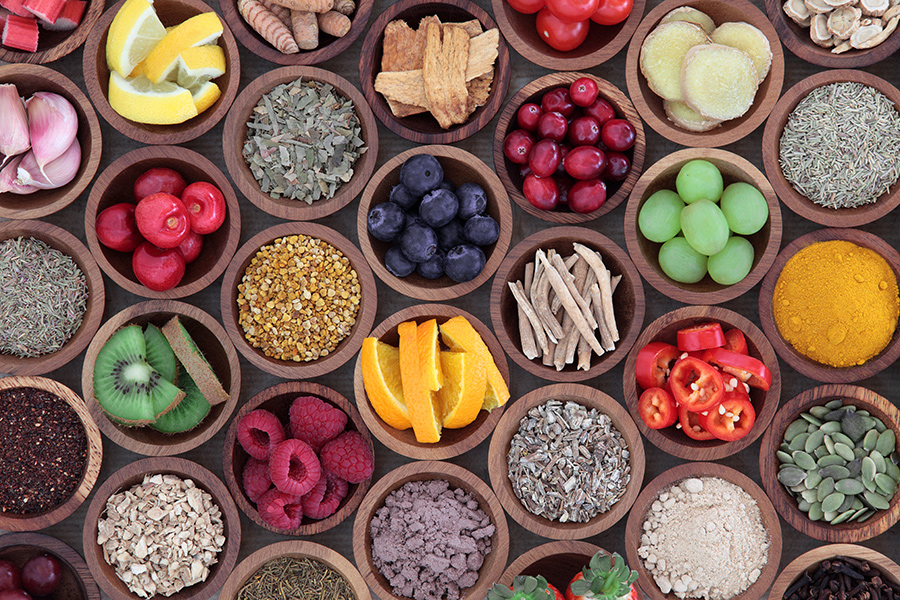Immune boosting foods
Wednesday, March 16, 2022

The ongoing COVID-19 pandemic is a compelling reminder of the importance of having and maintaining a healthy immune system. Like myself, many of you might be asking yourself “is my immune system is strong and functioning properly. If not, what can I do to strengthen it? Could food choices I make help to boost or weaken my immune system?” To answer those questions, first, we need to understand function of the immune system in our body.
The immune system consists of two sub-systems, adaptive (specific) and innate (non-specific) immune systems. The adaptive system uses specific receptors to recognize and remember particular foreign antigens. As the term implies, foreign antigens come from outside the body. They may be substances produced by viruses or microorganisms, certain food proteins, and components of serum and red blood cells from other individuals. Antigens stimulate an immune response to fight infections in the body.
Innate immunity is the first line of defense against pathogens trying to enter our body. Skin, mucus, sweat and tears protect our body by obstructing pathogens entering the body. The cells in the innate immune system promptly react to pathogens. For example, natural killer cells are innate immune cells that eradicate virus-infected and mutated cells.
If you are looking for a single food or even a food group to boost or maintain a healthy immune system, I am afraid that approach is flawed. The term boosting refers to stimulating something above the normal level. Even a good balanced diet cannot boost the immune system, but it will help to maintain a functioning immune system by averting micro and macronutrient deficiencies. A number of nutrients including vitamin C, vitamin D, zinc, selenium, iron and protein have been recognized as essential nutrients for the growth and function of immune cells.
I am sure you all have heard how chicken soup helps you to recover from flu or cold faster. Unfortunately, that is a fad. There is no scientific evidence or clinical studies showing chicken soup actually aids healing. Yet, many essential nutrients are naturally present in various plant and animal foods. Going back to the chicken soup example, if you look at the ingredients, you would see that chicken soup supplies some of the nutrients needed for growth of the immune cells including protein and zinc from the chicken, vitamin A from carrots, vitamin C from celery and onions, and antioxidants in onions and herbs. So, by all means have a tasty bowl of chicken soup if you are not feeling good but not so bad that you have to consult with a physician.
Gut microbiota also play a vital role in maintaining a strong immune system. Unhealthy gut microbiota may lead to acute and chronic disorders, consequently weakening the immune system. Considering that type and function of the microorganisms present in gut are strongly associated with diet, having a healthy and balanced diet can help to improve overall health outcomes and maintenance of a strong immune system. Much scientific evidence exists supporting strong correlations between impaired immune response and older age, environmental toxins, obesity, chronic diseases, mental stress, sleeping disorder and nutritional deficiency. Hence, the immune system is very complex and its maintenance requires a multifaceted approach.
Some turn to dietary supplements to increase the intake of nutrients essential for growing immune cells. For example, Echinacea, garlic and tea catechins have been implicated to boost immune response. Unfortunately, there are not enough scientific studies to prove the latter benefit claims. If you are an individual with no major health condition, try to get those nutrients from foods through a balanced diet. However, certain populations, such as the elderly, pregnant women and ill people, could benefit from dietary supplements if they cannot follow a balanced diet or cannot eat a variety of foods.
According to the Director of Innovation & Insights at Mintel, Lynn Dornblaser, “when consumers were asked how the pandemic has impacted their consumption of immune boosting foods, 47% of U.S. consumers responded that they regularly consume immune-boosting foods now, compared to only 27% before the pandemic.” Products formulated with prebiotic and probiotic ingredients which are claimed to strengthen the immune system are quite popular with health conscious consumers. Probiotics are live beneficial bacteria/microorganisms, and prebiotics are fiber and oligosaccharides which feed and support beneficial microorganisms in the intestinal system. Brands like Honey Cinnamon SuperGrain + Immunity Bar and BIU I Need Immunity functional water are making immunity related health claim.
I agree with the recommendations of the nutrition experts at the Harvard School of Public Health for maintaining a healthy immune system: a) Have a balance diet containing variety of food groups including fruits, vegetables and whole grains. b) If you do not have access or means to eat a balance diet, consider nutrient supplements. Pay attention to the dose of the supplements you are taking, though. Intake of nutrients at the amount greater than 100% of the recommended daily allowance (RDA) often does not offer additional benefit. Remember, in some cases extra-large doses of nutrients can be harmful. c) Although it might not be easy, try to manage stress. d) Try to keep a consistent, eight-hour sleep schedule. e) Frequently wash your hands throughout the day.
References:
https://www.ift.org/news-and-publications/digital-exclusives/consumers-seek-immune-boost
https://www.hsph.harvard.edu/nutritionsource/nutrition-and-immunity/
